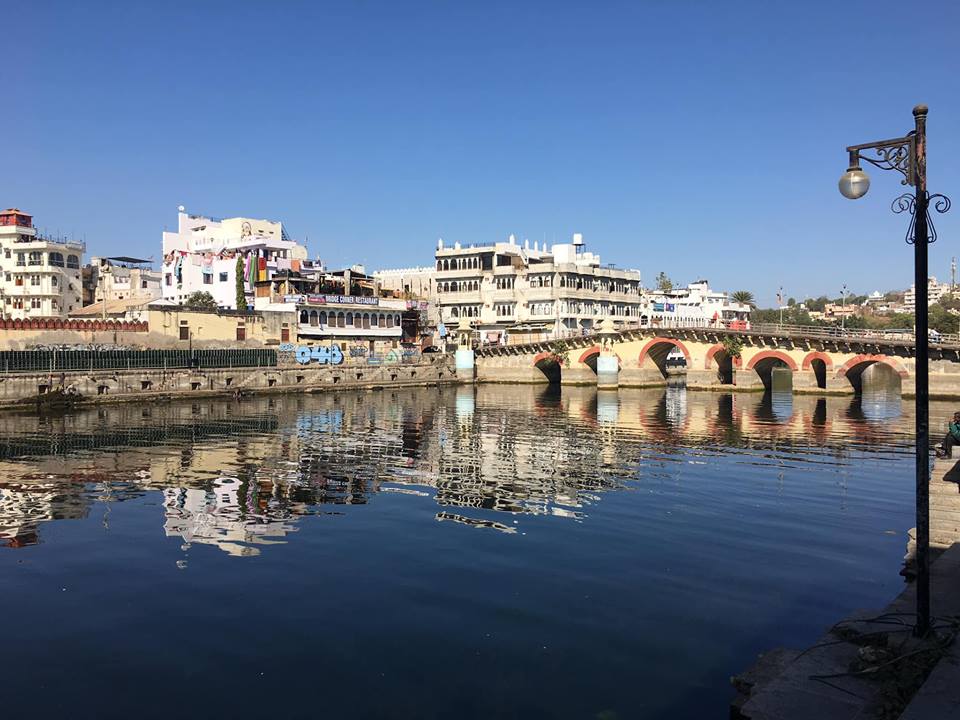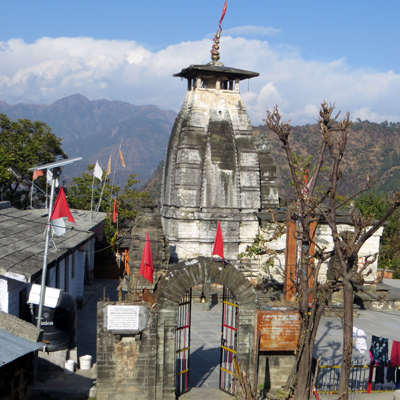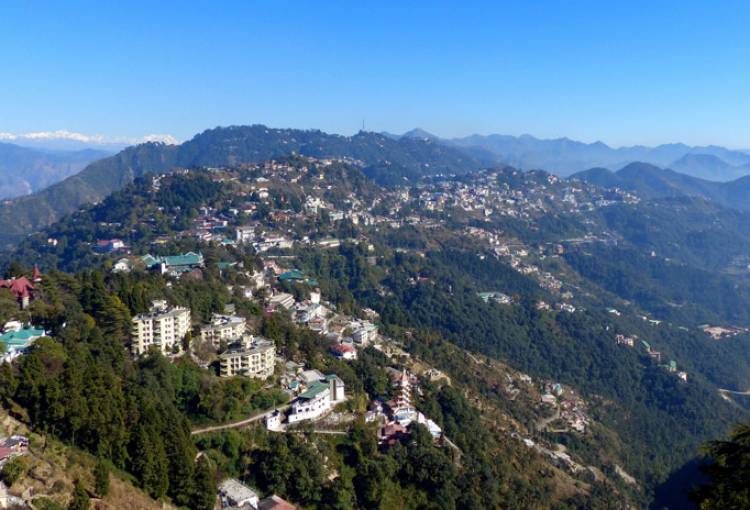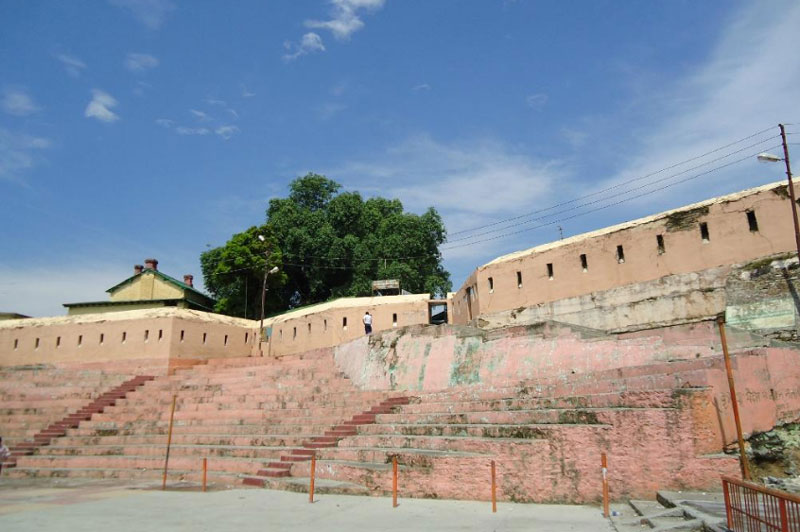The future rani was born to a high-caste prominent Brahmin family in Benares (now Varanisi) in northern India on November 19, 1827. Formally named Manikarnika, she was called “Manu” by her parents. Her mother, Bhagirathi, died when she was 4. Under the care of her father, Moropant Tambe, her education included horsemanship, fencing and shooting. In 1842 she became the second wife of Gangadhar Rao Niwalkar, the childless raja of Jhansi, a principality in Bundelkhand.

Painted portrait of Lakshmi Bai in cavalry uniform. (The British Library)
Renamed Lakshmi Bai, the young rani bore one son in 1851, but he died four months later. In 1853, following a serious illness, Gangadhar Rao adopted a distant cousin named Damodar Rao as his son—similarly, Gangadhar and the brother who had preceded him on the throne were adopted heirs. The adoption papers and a will naming the 5-year-old boy as Rao’s heir and the rani as regent were presented to a Major Ellis, who was serving as an assistant political agent at Jhansi on November 20, 1853. Gangadhar Rao died the following day. Ellis forwarded the information to his superior, Major John Malcolm, a Scottish soldier and the East India company representative in charge of the region, then controlled by Britain’s East India Company. Ellis was sympathetic to the rani’s claims, and even Malcolm, who did not support her regency, described the young widow in a letter to India’s Governor-General James Andrew Broun-Ramsay, 1st Marquess of Dalhousie, as “a woman highly respected and esteemed, and I believe fully capable of doing justice to such a charge.”
Under Lord Dalhousie, the British government had adopted an aggressive policy of annexing Indian states. Charges of mismanagement often offered an excuse. Another justification, applied with increasing frequency after 1848, was the Doctrine of Lapse, which placed any sovereign Indian state as a vassal state under British rule through the East India Company. The British already exercised the right to recognize the monarchical succession in Indian states that were dependent upon them. As a corollary, Dalhousie claimed that if the adoption of an heir to the throne was not ratified by the government, the state would pass by “lapse” to the British.
‘Meri Jhansi Nahin Doongi’
On 7th March 1854, the British issued a gazette dissolving the State of Jhansi. Rani Lakshmibai was enraged due to the injustice when an English officer, Major Ellis came to meet Lakshmibai. He read out the official declaration dissolving the State. The furious Rani Lakshmibai told Ellis ‘‘Meri Jhansi Nahin Doongi (I shall not part with my Jhansi)’ when he sought her permission to leave. Ellis heard her and left. Battle of 1857 The battle for freedom that started from January 1857 engulfed even Meerut on 10th May.
Along with Meerut, Delhi and Bareilly, Jhansi also was freed from the British rule. Three years after Jhansi was freed, Rani Lakshmibai took over the control of Jhansi and she made preparations to defend Jhansi from the likely attack by the British. Sir Hugh Rose was appointed by the British to capture Rani Lakshmibai, alive. On 20th March 1858, Sir Huge encamped with his army 3 miles away from Jhansi and sent a message to her that she should surrender; but rather than surrendering, she stood on the rampart of her fort motivating her army to fight with the British. The battle started. Jhansi canons started routing the British. Even after 3 days of continuous firing, the fort of Jhansi could not be attacked; therefore, Sir Hugh decided to adopt the path of treachery. Finally, on 3rd April, the army of Sir Hugh Rose entered Jhansi.
The soldiers started looting people. Rani Lakshmibai decided to join Peshava by breaking the bloc of the enemy. In the night, with her troupe of trusted 200 cavalry, she tied her 12 year old son Damodar to her back and raising the slogan of ‘Jai Shankar’ left her fort. She penetrated the British bloc and rode towards Kalpi. Her father Moropant was with her. While breaking the faction of the British army, her father got injured, was captured by the British and was hanged.
Fight of Kalpi
After riding continuously for 24 hours covering a distance of 102 miles, the Rani reached Kalpi. Peshava judged the situation and decided to help her. He provided his squads of army to her as per her requested requirement. On 22nd May, Sir Hugh Rose attacked Kalpi. Rani Lakshmibai rushed to the front like lightening whilst holding her sword. Her forceful attack resulted in a setback for the British army. Sir Hugh Rose disturbed with this setback brought his reserved camel troops onto the battlefield. The fresh reinforcement of the army affected the ardour of the revolutionaries and Kalpi was taken over by the British on 24th May. Defeated Raosaheb Peshave, Nawab of Banda, Tatya Tope, Rani Lakshmibai of Jhansi and all the chieftains gathered at Gopalpur. Laksmibai suggested taking over Gwalior. Shinde, the Ruler of Gwalior, was pro-British. Rani Lakshmibai won over Gwalior and handed it over to Peshava.
Sacrifice of life on the altar of freedom
Sir Hugh Rose had heard about the defeat of Gwalior by Rani Lakshmibai. He realized that the situation could go out of control if time was wasted; therefore, he marched towards Gwalior. Lakshmibai and Peshva decided to fight the British as Sir Hugh Rose touched Gwalior. Lakshmibai took it upon herself to safeguard the East side of Gwalior. The unprecedented valour of Laksmibai inspired her army; even her maids attired in men’s uniform took to the battlefield. The bravery of Lakshmibai, resulted in the retreat of the British army.
On 18th June, the British attacked Gwalior from all sides. She decided to break the enemy front and go out rather than surrendering. While breaking the military front, she came across a garden. She was not riding her ‘Rajratan’ horse. The new horse started going round and round near a canal instead of jumping and crossing it. Rani Lakshmibai realized the consequences and turned back to attack the British army. She got injured, started bleeding and fell from her horse. Being in a man’s costume, the soldiers did not recognize her and left her there. The faithful servants of Rani took her to a nearby Gangadas Mutt and gave her Gangajal. She expressed her last wish that her body should not be touched by any British men and embraced a brave death. The revolutionaries all over the world, the organization of Sardar Bhagat Singh and in the end even the army of Netaji Subhashchandra Bose were inspired by the valour shown by Rani Lakshmibai. The Queen of Jhansi breathed her last at the young age of 23 years.
She inspired many generations of Hindustani’s, thus becoming immortal in the freedom fight. We bow before such a brave warrior, the Queen of Jhansi Lakshmibai. The life history of the Rani of Jhansi Lakshmibai, who preferred to sacrifice her life at the young age of 23 years in battle, is very inspiring. She surprised the British by showing extraordinary fighting spirit and valour in battles fought at Jhansi, then Kalpi and lastly at Gwalior. The British Major Sir Hugh Rose had to come down to treachery so as to be able to win over the fort of Jhansi. Such an extraordinary lady, who tied her son on her back while fighting the battle, will not be found in the history of the world. The valour and brave death she chose, which gave inspiration to the patriots belonging to the ‘Gadar’ party in the First World War, the organization of Shahid Bhagat Singh and to all revolutionaries from Swatatntryaveer Savarkar to Subhashchandra, is magnificent. Lot of literature has been written on the life history of Rani Lakshmibai of Jhansi. Heroic poems have been composed in her honor.
Unknown qualities of ‘Ranaragini Rani Lakshmibai’ !
Article by Late Vishnupant Godse
Fearless fight with the British is what one remembers when one hears the name of Rani Lakshmibai. This ‘Kshastra vrutti’ was created in her due to her following certain things in a much disciplined manner. Besides, she was also a strong administrator. There are a number of her qualities about which many of us have no knowledge. Late Vishnupant Godse from Varsai (Taluka Penn, Dist. Raigad) had written down travelogues of his journey to North India and since he had met Rani Lakshmibai, we are able to know these details. He has thus obliged his future generations by writing down these things. A section of the Society is trying to destroy history out of their hatred towards Brahmin community and they are trying to devalue contribution of Brahmins in history. This article by Godse Guruji, will help us to know how it is necessary to foil attempts of such devaluing of Brahmins and in fact, how this community has obliged society.
Childhood
Lakshmibai was the only daughter of Shri. Moropant Tambe, employed with Shrimant Bajirao Peshave. She lost her mother when she was quite young; therefore, Moropant tried to train her in everything. Later, she was married to Raje Gangadharbaba of Jhansi ‘sansthan (small State)’ and her name was changed to Lakshmibai.
Her in-laws were very religious and abiding by Dharma
Sri Mahalakshmi was the family Deity of Jhansi’s rulers’ family. In front of South gate of Jhansi, there is a temple of Sri Mahalakshmi in a big lake. The king of Jhansi had made all arrangements of performing ‘puja’ at this temple and lighting of lamp all the time. There are many temples in the town and all of them were managed by the ‘Sansthan’. After the death of King Gangadharbaba, Rani Lakshmibai efficiently managed them.
Rani abiding by Dharma
After the death of Raje Gangadharbaba, management of his ‘sansthan’ was taken over by the British. After her husband’s death, Rani wanted to go to Sri Kshetra Prayag for shaving her head; but permission of the British was required for the same which was being delayed. Lakhsmibai, therefore, observed a rule that till she could shave off her head, she would smear ‘Bhasma’ after bath and make offering of Rs.3/- to 3 Brahmins every day. Accordingly, Rani used to get up early and finish her bath etc. and wearing a white sari, she used to perform ‘puja’ of ‘Parthiv Linga (linga made of soil)’ every day after ‘Tulsi-puja’.
Regular physical exercises
Lakshmibai liked to exercise right from her childhood and to go for horse-ride regularly. Even after becoming a queen of Jhansi, she used to get up early and did exercises. Then she used to go for horse-ride followed with a ride on elephant. This was her routine.
Good judge of horses
Rani Lakshmibai was a good judge of horses. She was known for her knowledge of horses. Once a horse-seller went to King Babasaheb Apate of Sri Kshetra Ujjain with two good horses; but he could not judge them. Then the seller went to Shrimant Jayajiraje Shinde of Gwalior; but he too was unable to make out the quality of horses. Finally, he came to Jhansi. Rani Lakshmibai had a ride on one horse and told the seller that the horse was of good-bred and offered Rs. 1200/- to him. Then she rode the other horse and offered him only Rs. 50/- for the same; telling that the horse had hurt its chest. The seller accepted the facts. Those, who had examined the horses earlier, had said that both the horses were of equal strength.
Rani cared for her subjects
Once, Jhansi was badly hit with severe winter. About 1000-1200 beggars gathered near the South Gate of the city. When Rani went for ‘darshan’ of Sri Mahalakshmi, she saw the crowd and asked her minister about them. He informed Rani that poor people were asking for some coverlets for protection from cold. Rani issued an order that by fourth day, all poor people from the town should be distributed a cap, coat and blanket and the order was executed.
Prompt punishment to offenders
In Jhansi State, there was a small town named Balavsagar. The local citizens were harassed due to thieves. Rani went to this place and stayed for 15 days taking care of the problem. Many offenders were hanged and some were imprisoned.
Ranaragini Lakshmibai
The British army laid siege to Jhansi town with 60,000 soldiers. Rani had resolved to fight with the British. She personally looked into every detail of preparing for the battle. The first missile was fired at the British army by Rani. For 11 days, she gave an apt reply to the British; but betrayals by own people, made it easy for the British to enter Jhansi. Rani charged on the British with 3000 soldiers and there was a tough fight between them.
Going to Kalpi
Few ‘Sardars’ advised Rani to go back to the fort with few soldiers. Rani realised that it was difficult to fight as the number of British soldiers was high. With selected 1500 soldiers, Rani decided to go to Kalpi leaving her fort in the midnight and she cut the siege and went to Kalpi. Tying her adopted son on her back, riding on a horse, she cut the siege with sword; but most of her soldiers got killed. She swiftly went to Kalpi only with one of her maids.
Battle with British was a ‘Dharma-yuddha’ !
At Kalpi, Rani met Shrimant Nanasaheb Peshave and Tatya Tope. Later, along with them only, she fought with the British. At one place, Rani went to battle field with her chief ‘Sardar’; there was a huge fight but she had to face defeat. At a place near Kalpi, she met Godse Guruji, who was in her service earlier. During that meeting, she told him about the participation in 1857 revolt. Rani told Godse Guruji that she had very few things left with her (She could have lived peacefully with whatever the British offered her); ‘I am a widow and had no needs; but thinking about all Hindus and Dharma, I thought of taking such action.’
Brave Rani of Jhansi, faces death while fighting !
Shrimant Nanasaheb Peshave, Tatya Tope and Rani Lakshmibai won over Gwalior; but Jayajiraje Shinde, who had run away, took help of the British and attacked again. At Gwalior, a battle was fought during which Rani was hit with a bullet; but in that condition also, she kept on fighting. Finally, she was hit with sword and fell from her horse; but Tatya Tope immediately took her body and broke the siege. He cremated her and did last rites. Thus, Rani Lakshmibai, who fought for her Dharma, is known even today as a brave queen as ‘Khub Ladi Mardani, woh to Jhanisiwali Rani Thi !’
Poem – Jhansi ki rani
Poet – Subhadrakumari Chauhan
सिंहासन हिल उठे राजवंशों ने भृकुटी तानी थी,
बूढ़े भारत में भी आई फिर से नयी जवानी थी,
गुमी हुई आज़ादी की कीमत सबने पहचानी थी,
दूर फिरंगी को करने की सबने मन में ठानी थी।
चमक उठी सन सत्तावन में, वह तलवार पुरानी थी,
बुंदेले हरबोलों के मुँह हमने सुनी कहानी थी,
खूब लड़ी मर्दानी वह तो झाँसी वाली रानी थी।।
कानपूर के नाना की, मुँहबोली बहन छबीली थी,
लक्ष्मीबाई नाम, पिता की वह संतान अकेली थी,
नाना के सँग पढ़ती थी वह, नाना के सँग खेली थी,
बरछी, ढाल, कृपाण, कटारी उसकी यही सहेली थी।
वीर शिवाजी की गाथायें उसको याद ज़बानी थी,
बुंदेले हरबोलों के मुँह हमने सुनी कहानी थी,
खूब लड़ी मर्दानी वह तो झाँसी वाली रानी थी।।
लक्ष्मी थी या दुर्गा थी वह स्वयं वीरता की अवतार,
देख मराठे पुलकित होते उसकी तलवारों के वार,
नकली युद्ध-व्यूह की रचना और खेलना खूब शिकार,
सैन्य घेरना, दुर्ग तोड़ना ये थे उसके प्रिय खिलवाड़|
महाराष्ट्र-कुल-देवी उसकी भी आराध्य भवानी थी,
बुंदेले हरबोलों के मुँह हमने सुनी कहानी थी,
खूब लड़ी मर्दानी वह तो झाँसी वाली रानी थी।।
हुई वीरता की वैभव के साथ सगाई झाँसी में,
ब्याह हुआ रानी बन आई लक्ष्मीबाई झाँसी में,
राजमहल में बजी बधाई खुशियाँ छाई झाँसी में,
सुघट बुंदेलों की विरुदावलि-सी वह आयी थी झांसी में,
चित्रा ने अर्जुन को पाया, शिव को मिली भवानी थी,
बुंदेले हरबोलों के मुँह हमने सुनी कहानी थी,
खूब लड़ी मर्दानी वह तो झाँसी वाली रानी थी।।
उदित हुआ सौभाग्य, मुदित महलों में उजियाली छाई,
किंतु कालगति चुपके-चुपके काली घटा घेर लाई,
तीर चलाने वाले कर में उसे चूड़ियाँ कब भाई,
रानी विधवा हुई, हाय! विधि को भी नहीं दया आई।
निसंतान मरे राजाजी रानी शोक-समानी थी,
बुंदेले हरबोलों के मुँह हमने सुनी कहानी थी,
खूब लड़ी मर्दानी वह तो झाँसी वाली रानी थी।।
बुझा दीप झाँसी का तब डलहौज़ी मन में हरषाया,
राज्य हड़प करने का उसने यह अच्छा अवसर पाया,
फ़ौरन फौजें भेज दुर्ग पर अपना झंडा फहराया,
लावारिस का वारिस बनकर ब्रिटिश राज्य झाँसी आया।
अश्रुपूर्ण रानी ने देखा झाँसी हुई बिरानी थी,
बुंदेले हरबोलों के मुँह हमने सुनी कहानी थी,
खूब लड़ी मर्दानी वह तो झाँसी वाली रानी थी।।
अनुनय विनय नहीं सुनती है, विकट शासकों की माया,
व्यापारी बन दया चाहता था जब यह भारत आया,
डलहौज़ी ने पैर पसारे, अब तो पलट गई काया,
राजाओं नव्वाबों को भी उसने पैरों ठुकराया।
रानी दासी बनी, बनी यह दासी अब महरानी थी,
बुंदेले हरबोलों के मुँह हमने सुनी कहानी थी,
खूब लड़ी मर्दानी वह तो झाँसी वाली रानी थी।।
छिनी राजधानी दिल्ली की, लखनऊ छीना बातों-बात,
कैद पेशवा था बिठूर में, हुआ नागपुर का भी घात,
उदैपुर, तंजौर, सतारा,कर्नाटक की कौन बिसात?
जब कि सिंध, पंजाब ब्रह्म पर अभी हुआ था वज्र-निपात।
बंगाले, मद्रास आदि की भी तो वही कहानी थी,
बुंदेले हरबोलों के मुँह हमने सुनी कहानी थी,
खूब लड़ी मर्दानी वह तो झाँसी वाली रानी थी।।
रानी रोयीं रनिवासों में, बेगम ग़म से थीं बेज़ार,
उनके गहने कपड़े बिकते थे कलकत्ते के बाज़ार,
सरे आम नीलाम छापते थे अंग्रेज़ों के अखबार,
‘नागपुर के ज़ेवर ले लो लखनऊ के लो नौलख हार’।
यों परदे की इज़्ज़त परदेशी के हाथ बिकानी थी,
बुंदेले हरबोलों के मुँह हमने सुनी कहानी थी,
खूब लड़ी मर्दानी वह तो झाँसी वाली रानी थी।।
कुटियों में भी विषम वेदना, महलों में आहत अपमान,
वीर सैनिकों के मन में था अपने पुरखों का अभिमान,
नाना धुंधूपंत पेशवा जुटा रहा था सब सामान,
बहिन छबीली ने रण-चण्डी का कर दिया प्रकट आहवान।
हुआ यज्ञ प्रारम्भ उन्हें तो सोई ज्योति जगानी थी,
बुंदेले हरबोलों के मुँह हमने सुनी कहानी थी,
खूब लड़ी मर्दानी वह तो झाँसी वाली रानी थी।।
महलों ने दी आग, झोंपड़ी ने ज्वाला सुलगाई थी,
यह स्वतंत्रता की चिनगारी अंतरतम से आई थी,
झाँसी चेती, दिल्ली चेती, लखनऊ लपटें छाई थी,
मेरठ, कानपुर,पटना ने भारी धूम मचाई थी,
जबलपुर, कोल्हापुर में भी कुछ हलचल उकसानी थी,
बुंदेले हरबोलों के मुँह हमने सुनी कहानी थी,
खूब लड़ी मर्दानी वह तो झाँसी वाली रानी थी।।
इस स्वतंत्रता महायज्ञ में कई वीरवर आए काम,
नाना धुंधूपंत, ताँतिया, चतुर अज़ीमुल्ला सरनाम,
अहमदशाह मौलवी, ठाकुर कुँवरसिंह सैनिक अभिराम,
भारत के इतिहास गगन में अमर रहेंगे जिनके नाम।
लेकिन आज जुर्म कहलाती उनकी जो कुरबानी थी,
बुंदेले हरबोलों के मुँह हमने सुनी कहानी थी,
खूब लड़ी मर्दानी वह तो झाँसी वाली रानी थी।।
इनकी गाथा छोड़, चले हम झाँसी के मैदानों में,
जहाँ खड़ी है लक्ष्मीबाई मर्द बनी मर्दानों में,
लेफ्टिनेंट वाकर आ पहुँचा, आगे बढ़ा जवानों में,
रानी ने तलवार खींच ली, हुया द्वंद असमानों में।
ज़ख्मी होकर वाकर भागा, उसे अजब हैरानी थी,
बुंदेले हरबोलों के मुँह हमने सुनी कहानी थी,
खूब लड़ी मर्दानी वह तो झाँसी वाली रानी थी।।
रानी बढ़ी कालपी आई, कर सौ मील निरंतर पार,
घोड़ा थक कर गिरा भूमि पर गया स्वर्ग तत्काल सिधार,
यमुना तट पर अंग्रेज़ों ने फिर खाई रानी से हार,
विजयी रानी आगे चल दी, किया ग्वालियर पर अधिकार।
अंग्रेज़ों के मित्र सिंधिया ने छोड़ी राजधानी थी,
बुंदेले हरबोलों के मुँह हमने सुनी कहानी थी,
खूब लड़ी मर्दानी वह तो झाँसी वाली रानी थी।।
विजय मिली, पर अंग्रेज़ों की फिर सेना घिर आई थी,
अबके जनरल स्मिथ सम्मुख था, उसने मुहँ की खाई थी,
काना और मंदरा सखियाँ रानी के संग आई थी,
युद्ध श्रेत्र में उन दोनों ने भारी मार मचाई थी।
पर पीछे ह्यूरोज़ आ गया, हाय! घिरी अब रानी थी,
बुंदेले हरबोलों के मुँह हमने सुनी कहानी थी,
खूब लड़ी मर्दानी वह तो झाँसी वाली रानी थी।।
तो भी रानी मार काट कर चलती बनी सैन्य के पार,
किन्तु सामने नाला आया, था वह संकट विषम अपार,
घोड़ा अड़ा, नया घोड़ा था, इतने में आ गये सवार,
रानी एक, शत्रु बहुतेरे, होने लगे वार-पर-वार।
घायल होकर गिरी सिंहनी उसे वीर गति पानी थी,
बुंदेले हरबोलों के मुँह हमने सुनी कहानी थी,
खूब लड़ी मर्दानी वह तो झाँसी वाली रानी थी।।
रानी गई सिधार चिता अब उसकी दिव्य सवारी थी,
मिला तेज से तेज, तेज की वह सच्ची अधिकारी थी,
अभी उम्र कुल तेइस की थी, मनुज नहीं अवतारी थी,
हमको जीवित करने आयी बन स्वतंत्रता-नारी थी,
दिखा गई पथ, सिखा गई हमको जो सीख सिखानी थी,
बुंदेले हरबोलों के मुँह हमने सुनी कहानी थी,
खूब लड़ी मर्दानी वह तो झाँसी वाली रानी थी।।
जाओ रानी याद रखेंगे ये कृतज्ञ भारतवासी,
यह तेरा बलिदान जगावेगा स्वतंत्रता अविनासी,
होवे चुप इतिहास, लगे सच्चाई को चाहे फाँसी,
हो मदमाती विजय, मिटा दे गोलों से चाहे झाँसी।
तेरा स्मारक तू ही होगी, तू खुद अमिट निशानी थी,
बुंदेले हरबोलों के मुँह हमने सुनी कहानी थी,
खूब लड़ी मर्दानी वह तो झाँसी वाली रानी थी।।
Poem on Samadhi of queen of Jhansi
Poet – Subhadrakumari Chauhan
इस समाधि में छिपी हुई है, एक राख की ढेरी |
जल कर जिसने स्वतंत्रता की, दिव्य आरती फेरी ||
यह समाधि यह लघु समाधि है, झाँसी की रानी की |
अंतिम लीलास्थली यही है, लक्ष्मी मरदानी की ||
यहीं कहीं पर बिखर गई वह, भग्न-विजय-माला-सी |
उसके फूल यहाँ संचित हैं, है यह स्मृति शाला-सी |
सहे वार पर वार अंत तक, लड़ी वीर बाला-सी |
आहुति-सी गिर चढ़ी चिता पर, चमक उठी ज्वाला-सी |
बढ़ जाता है मान वीर का, रण में बलि होने से |
मूल्यवती होती सोने की भस्म, यथा सोने से ||
रानी से भी अधिक हमे अब, यह समाधि है प्यारी |
यहाँ निहित है स्वतंत्रता की, आशा की चिनगारी ||
इससे भी सुन्दर समाधियाँ, हम जग में हैं पाते |
उनकी गाथा पर निशीथ में, क्षुद्र जंतु ही गाते ||
पर कवियों की अमर गिरा में, इसकी अमिट कहानी |
स्नेह और श्रद्धा से गाती, है वीरों की बानी ||
बुंदेले हरबोलों के मुख हमने सुनी कहानी |
खूब लड़ी मरदानी वह थी, झाँसी वाली रानी ||
यह समाधि यह चिर समाधि है , झाँसी की रानी की |
अंतिम लीला स्थली यही है, लक्ष्मी मरदानी की ||













8 Comments
Comments are closed.